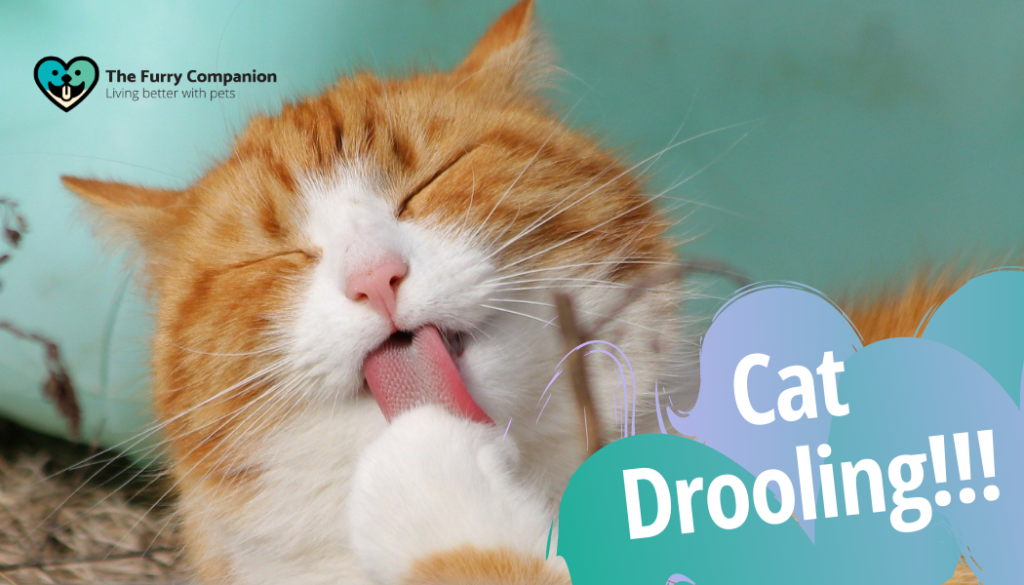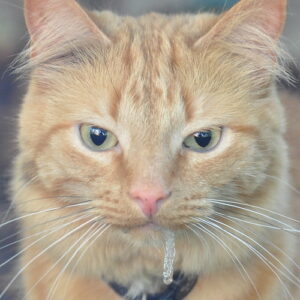
When we think of cats, we don’t think of them with their mouths open, tongues rolled out, and saliva dripping out. Unlike dogs, drooling isn’t something you catch sophisticated felines doing. But occasionally, you may see them salivating over something. But when is it normal, and when is it a cause for concern? The Furry Companion brings you an article discussing reasons for cat drooling and what you should do when it happens.
Table of Contents
1. Cat Drooling Due to Relaxation or Happiness
There are instances when a cat feels relaxed that drool may escape their mouths. This response is similar to that of dogs’ but is not as expected. “If a cat is drooling when you’re either holding them, petting them, or cuddling them, that likely means they’re relaxed and enjoying your company,” explains Gerardo Perez-Camargo, DVM.
You may also notice them kneading at the same time. As kittens, they knead their mother’s stomach when they feed. They may mimic this behavior when they feel relaxed, and drooling may accompany it. The adult cat might salivate as a response to the memory of milk and feeding.
To give your feline friend the best care possible, provide them excellent nutrition as well. To do that, you might want to check out the best wet cat food for them.
View this post on Instagram
Likewise, cat drooling may also occur when they’re sleeping. You can’t deny that you let out a little saliva yourself when you’re catching z’s. Your feline friend may also experience the same as they may lose control of their body when they’re fast asleep.
If these reasons are the cause of drooling, there’s no need to worry. However, if you want to be extra sure that nothing is wrong, you can consult with your veterinarian.
2. Foreign Object in the Mouth
If you have a pet, you know how curious our furry companions can be. And that curiosity can sometimes lead to them chomping down on something they shouldn’t. Foreign objects in the mouth can also lead to cat drooling. Something may be irritating their mouth, causing the extra salivation.
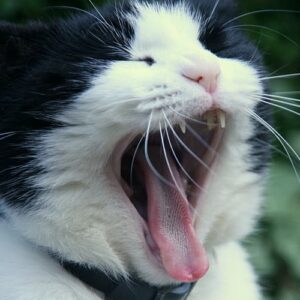
If you suspect that your cat got into something, examine their mouth. Your cat may try to resist as you probe, so it may be wise to have someone help you. Have the second person hold them or swaddle them in a towel or blanket. With your thumb and forefinger, hold the sides of their upper teeth. Use the other hand to lower their lower jaw and check for anything in their mouth.
You might find something such as a piece of string, a bone, a toy, a blade of grass, or a bug. They can usually remove foreign objects from their mouth, but they may get stuck in their teeth. If something has punctured their mouth, it may be time to go to a vet. Be careful when pulling things out, especially if it’s a piece of string. The same may be tied around something they ingested, and you may cause harm.
3. Mouth Disease or Dental Issues
Something many owners forget to do is brush their pet’s teeth. This part of the routine is a must when maintaining good dental health and hygiene. Doing so prevents dental problems and mouth disease, both of which may cause excessive cat drooling.
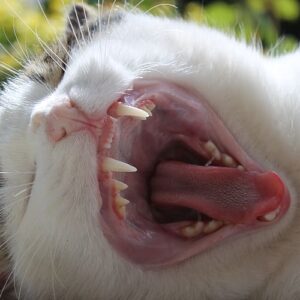
“Dental disease, inflammation of the gums, and oral tumors can cause drooling along with possible bad breath, blood around mouth, and possible inappetence,” explains Jessica Herman, DVM.
It’s not always easy to detect dental disease. To check if your cat has good oral and dental health, examine the teeth. If they appear brown and have a stony texture, they may need professional cleaning. Also, check if their gums are healthy: they should be pink but not pale nor red and bleeding.
Visit the vet clinic if you think they may have dental problems. They may need a deep cleaning to improve their oral health and reduce salivation.
4. Nausea and Anxiety
View this post on Instagram
We’re sure everyone has vomited at some point in their life, so you should be familiar with how that feels. When you’re about to throw up, salivation will often precede it, and it’s the same for your feline friend. When they’re about to hurl something up, expect some cat drooling.
There may be several causes for the nausea, including eating something foul, indigestion, kidney disease, internal parasites, and other gastrointestinal problems. If they’re lethargic after or have a poor appetite, bring them to the vet. The cat drooling and vomiting may be due to an underlying health problem.
Additionally, anxiety may also cause nausea and cat drooling. Yes, our furry companions also feel worried and anxious. Fear can also cause an upset stomach. If you’ve just taken them on a long trip to an unfamiliar environment, they may show signs of anxiety, thus, nausea.
5. Trauma and Injury
View this post on Instagram
With how curious some pets may be, they also get into trouble. They can get into accidents, fights, or other harm and come out injured. Jaw fractures and broken teeth can lead to unusual cat drooling. As we mentioned earlier, they can also have foreign objects puncture them in the mouth, such as wood chips, broken bones, hooks, and the like. Those may also cause inflammation, pain, and excessive cat drooling.
Immediately seek out professional help if you find that your cat has gone through physical trauma or injury. Doing so will prevent your cat’s condition from worsening and from further accidents and pain. Get this Cat Kit for your pet.
6. Cat Drooling Because of Medications
If you’ve ever been on any medicine, you know that they may come with some side effects. Medication for our pets can also come with such, including excessive salivation. Antibiotics and painkillers can cause cat drooling, and it’s not necessarily something you should worry about too much. However, they may also lick off anti-parasitic spot treatments that go on the skin. In this case, the liquid that they licked off may be harmful and cause nausea. Get your cat this drool stopper.
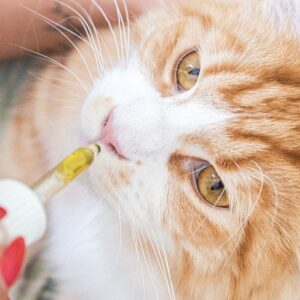
Consult with your veterinarian if you find your cat drooling excessively. Ensure that they have ample water ready at all times to avoid dehydration.
7. Illness
Lastly, several diseases and conditions may have cat drooling as a symptom. Gastrointestinal, kidney, and liver disease are just a few of the illnesses your pet may experience. Cancer, tumors, and rabies may also be a cause for excessive salivation.
“Cats drool when they are in pain,” says Ethan Nunnally, DVM. “Your cat might have stomatitis, an inflammation of the mouth and lips.”
Go through all the other potential causes in this article. If you think that none of them are prompting the cat drooling, there may be an underlying health problem. Take them to the vet at once, as it may be an emergency or advanced illness. It’s always better to be sure than regret not going to the veterinary clinic sooner. Give your cat this recuperation formula to help them heal faster.
Cat drooling may or may not be a cause for worry. Some salivation is expected, which you may attribute to felines feeling relaxed and happy or to something minor. It may be due to the medication they’re on or something stuck in their mouth.
Conclusion
View this post on Instagram
However, excessive cat drooling may point to something wrong. Cats may have oral and dental problems, feel nauseated, be injured, or be sick. When you think that something is amiss, the best option is always to bring them to a professional. Your friendly veterinarian should be able to get to the bottom of the unusual cat drooling. They’ll find the best remedy for it and get your cat back to feeling their best.
Frequently Asked Questions
Is Cat Drooling Bad?
It could be something concerning. Unlike dogs, cats aren’t likely to leave pools of saliva. A little amount is okay and isn’t cause for much concern, but excessive drooling may be worrisome. It could mean that your pet is ill, injured, or has eaten something that tastes bad. If you notice that it doesn’t go away after a few hours, it’s best to see a veterinarian and find the underlying cause.
Is My Cat In Pain When Drooling?
Yes, your cat most likely is experiencing pain. Since cats cannot communicate directly how they feel, some will excessively drool to somehow alleviate the pain in their mouth or teeth. As mentioned earlier, it can be an indication of inflammation of the mouth and lips or abscessed teeth. Consult your vet to manage the pain your cat might be experiencing.
Is Cat Drool Harmful to Humans?
Yes, but only if the cat is sick. Cat saliva may contain proteins that may trigger an allergy or bacteria that may cause illness like cat scratch disease (CSD). People may become ill if the germs in the drool get into an open wound. However, the saliva itself is not harmful if the cat is healthy and not infected.
Is Cat Saliva an Antiseptic?
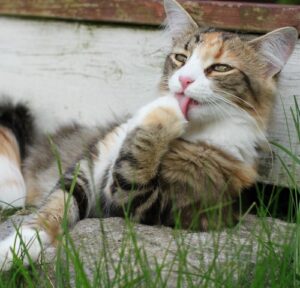
A cat’s saliva does have some antibacterial compounds, but it is not precisely an antiseptic. If your cat is injured or is recovering from surgery, licking their wounds may also be harmful. It could introduce germs into the area or pull their stitches before the cut has healed. So if you’re looking for something to sterilize your cat’s wounds, ask a vet instead of leaving it to your feline’s saliva.
How Clean is a Cat’s Mouth?
If we’re talking about cleanliness based on the number of bacteria in the mouth, it’s cleaner than a human’s. It has slightly more bacteria than a dog’s, but a person’s mouth is the worst of the three. Your feline’s mouth will have both good and bad bacteria. If they’re the type to lick you often, it’s best to have the vet check them regularly for parasites and diseases.
Why Does My Cat’s Drool Smell Bad?
Bad breath may be due to several causes: diet, dental disease, and oral tumors. You may smell a foul odor from your cat drooling simply because of something they ate. However, if it lasts a long time, there may be something more serious going on in their mouth. Try to do a gentle cleaning first and if that doesn’t get rid of the smell, consult with an animal professional.
Is Drooling a Sign of Rabies in a Cat?
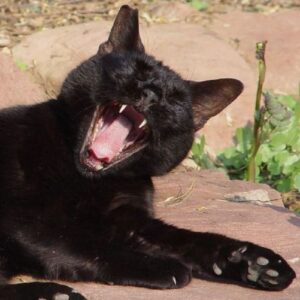
Yes, excessive cat drooling can be a sign of rabies. In the first stages of infection, you will notice changes in their behavior. Somehow, they’re acting differently from how they usually are. During the second stage, there is a loss of appetite, seizures, and difficulty swallowing, which leads to the unusual salivation. The last part is where they go into a coma and, unfortunately, pass.
What Diseases Can a Cat Pass On to Humans Through Their Saliva?
Of the illnesses a person can catch from cats, cat scratch disease (CSD) and rabies are transmittable through their saliva. A person may get CSD from scratches and bites as the bacteria may transfer to their claws during grooming. You may also get sick if cats lick your open wounds. As for rabies, a person can only catch it if the infected pet bites them.
Is it normal for cats to drool?
Drooling is not as common in cats as it is in dogs. So as a cat owner, it can be troubling when your cat drools. The reality is that drooling in cats can be caused by a variety of factors. For instance, it can be observed that your cat may sometimes drool when purring or at the sight or smell of food. In this case, you have nothing to worry about. It is important though that you observe your cat’s behavior. Assessing the case, getting to know your pet, and involving your veterinarian if needed are all important steps in determining the cause.
Why would a cat suddenly start drooling?

